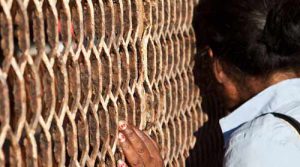Deferred Action Leaves Some Behind and in Limbo
New America Media

When she heard about President Obama’s announcement about offering temporary immigration relief to undocumented immigrant youth who came to the United States as children and were educated here, Judy Mendez, 29, thought it was too good to be true.
“Maybe I can finally go home,” she said.
Mendez grew up in the United States, attended elementary school and high school in Texas, and delivered twins there. She now lives in Tijuana, Mexico, where she moved “temporarily” in order to apply for legal status in the United States.
That was over five years ago. She thought she was doing the right thing.
As it turns out, she wasn’t.
According to the official criteria published by USCIS (US Citizenship and Immigration Services), people must presently live in the United States to qualify for the Deferred Action for Childhood Arrivals program, which offers a two-year “deferral” of deportation for people who came to the country when they were under 16. While it does not provide a path to citizenship or residency, the policy will grant temporary employment authorization. But since Mendez already left the country, she is ineligible.
When Obama first announced this policy, he explained, “These are young people who studied in our schools. They play in our neighborhoods. They’re friends with our kids. They pledge allegiance to our flag. They’re Americans in their heart, in their minds, in every single way, but one: on paper.”
The Justice Policy Institute estimates that approximately 936,930 young immigrants in the United States may qualify. But based on the criteria recently released by US-CIS, many who came here as children, went to school here, and are essentially American would be excluded. Anyone who has ever been convicted of a felony and, in some cases, a misdemeanor – is excluded. Even a misdemeanor DUI will disqualify people from the program. Any misdemeanor sentenced by 90 days or more in jail also triggers ineligibility, including a conviction for simple drug possession or shoplifting.
Department of Homeland Security says that it has not determined whether it will treat juvenile court cases as convictions. According to the official policy, records from juvenile court “will be assessed on a case-by-case basis.” According to the Immigrant Legal Resource Center, “DHS has not shown much leniency against youth with juvenile delinquency histories” in the past.
Many of the young people excluded by the policy have strong ties to the United States, including American citizen family members.
Griselda Ramos, a 29-year-old mother of three American citizen children, whose parents and six siblings are all U.S. citizens, was brought here when she was 5 years old. Once she came, she never left. All of her childhood memories are from the United States. She grew up here, went to school here, and started a family here.
“I was a legal permanent resident,” Ramos explained, “I passed my [citizenship] test and everything.” But she never became a citizen.
“When I passed my test and everything, they sent me to an immigration court with a judge because I had a domestic violence charge,” Ramos said, during a recent interview in Tijuana, Mexico, where she has been for the past three months.
“He was hitting me, so I was defending myself,” she said, adding that she was five months pregnant at the time. “I did have bruises.” But, she explained, she pled guilty to get out of jail, and she thought that would be the end of it.
Instead of becoming a citizen, Ramos was deported almost a year ago. She hasn’t seen her children – ages 2, 4, and 7 – since.
“Every time I talk to them, they want me back,” she said. They are living with her mother in Colorado. She doesn’t want to bring them to Mexico, because she can’t support them financially. “I’m not even stable, I don’t have money, I don’t have a place, nothing,” she said. Plus, she worries that they won’t get the services they need, especially because her two oldest have special needs. “One receives SSI,” she explained, because of developmental delays, and “the other one receives therapy with a psychologist.”
On the other hand, she said she feels torn because her kids need her. She’s looked into the possibility of returning to the United States. “I have to wait here for 20 years before I can apply for the waiver,” Ramos said. “And it all depends if they want to accept my application.” By the time she’s eligible for re-entry into the United States, her children will be adults.
“Every time I walk on the beach and I see the border I just want to jump over there,” she said sadly. Desperate to reunite with her children, she has already tried twice. Both times, she was caught. U.S. Customs and Border Patrol apprehended 340,252 attempting to enter the country without permission last year, including 286,154 along the Mexican border.
For many like Ramos, surviving in Mexico without any relatives or family is challenging.
“When I first got in to TJ, I was in shock,” she recalled. “Especially seeing the mountains with houses, and all the people outside.” Unable to find work since she doesn’t have a Mexican birth certificate, she’s caught in perpetual limbo. “My mom told me, ‘You don’t exist in Mexico,’” she said.


 Arturo Castañares
Arturo Castañares



